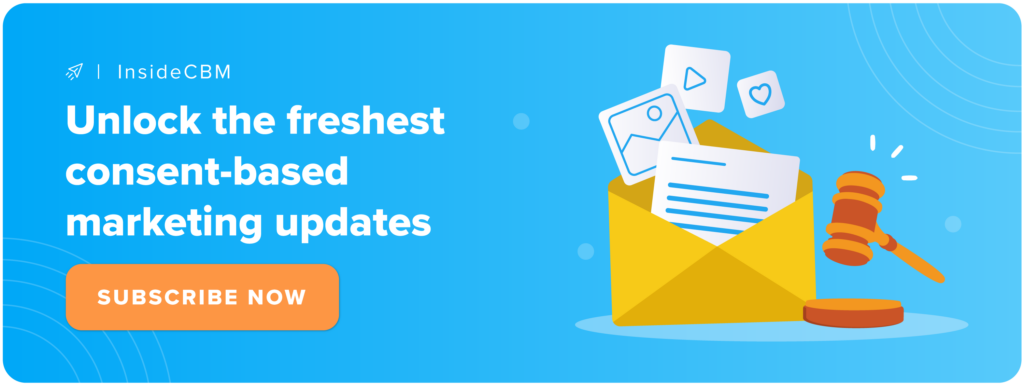TCPA consent: The complete guide for marketers

TCPA consent is not something that can be overlooked. It’s mandatory and regulated by U.S. federal law. For this reason, it’s vital for marketers and advertisers to comply with the TCPA consent agreement, in order to keep their business running smoothly and avoid legal issues.
However, there are a lot of different layers to the TCPA and many requirements that marketers need to follow, which can make compliance difficult to keep up with.
Thankfully, ActiveProspect is here to help you. In this article, we will go over what TCPA consent is, what are the TCPA disclosure requirements, and how to get TCPA express consent with the right language.

What is TCPA consent?
The TCPA (Telephone Consumer Protection Act), as explained by Eric J. Troutman of the Troutman Amin, LLP and TCPAWorld.com, is “the statute that prevents the use of certain regulated technology to make calls to cell phones and landlines without certain levels of consent – that are use-case specific – and prevents unsolicited marketing calls to phone numbers that are residential lines on the national DNC (Do Not Call) list.”
Therefore, TCPA consent can be defined as the process of asking consumers for express consent or express written consent to be contacted in order to promote a product or service.
In addition to understanding TCPA consent laws, businesses undergoing mergers and acquisitions may face operational complexities requiring robust compliance support. Such changes often necessitate integrated legal and oversight structures to harmonize new business entities with existing compliance frameworks. Leveraging expertise in restructuring can ensure seamless transitions.
TCPA express consent VS express written consent
What is the difference between TCPA express consent (or just express consent) and express written consent?
Express consent is not regulated or defined by the Federal Communications Commission (FCC), and it can be considered an agreement between the caller and the receiver indicating consent to be called at a particular number.
This type of consent can be implied. For example, if you give your phone number to your doctor, their office has presumed express consent to contact you for informational purposes consistent with the reason you provided the number. For example, they’re allowed to call you about your blood test results if you provide your phone number.
On the other hand, express written consent is clearly defined by the FCC as a written agreement between the caller and the receiver of the call that authorizes the caller to deliver “advertisements or telemarketing messages using an automatic telephone dialing system (ATDS) or an artificial pre-recorded voice.”
This type of consent must specify the receiver’s phone number and include their electronic signature, which can also just be a button affirming the agreement.
FCC TCPA express consent: What changes with the new updates
A recent announcement from the FCC has completely shifted the landscape for the lead generation industry. A pivotal alteration in the TCPA consent rules is set to redefine what “express consent” means.
The definition of FCC TCPA express written consent will change to the following:
“The term prior express written consent means an agreement, in writing, that bears the signature of the person called or texted that clearly and conspicuously authorizes no more than one identified seller to deliver or cause to be delivered to the person called or texted advertisements or telemarketing messages using an automatic telephone dialing system or an artificial or prerecorded voice.”
The new rule on one-to-one consent will be effective starting January 27, 2025.
If you’d like to stay updated with all the FCC TCPA updates, register to our FCC webinar series, where we listen to industry experts give insights and best practices to navigate the new TCPA consent rules with confidence.
As Eric J. Troutman of Troutman Amin, LLP and TCPAWorld.com explains, the FCC’s new rule impacts TCPA express consent and the lead generation industry as follows:
- It extends Do Not Call (DNC) protections to text messages.
- It re-defines prior express written consent to mean an agreement that “authorizes no more than one identified seller” at a time to contact a consumer. Importantly, the word “seller” means the company providing goods or services to a consumer–not a lead seller. Also, this requirement does not specify how many sellers can be listed on the web page; if the web page seeks to obtain prior express written consent from multiple sellers, the webpage must obtain express consent separately for each individual seller.
- It requires that “calls must be logically and topically associated with the interaction that prompted the consent.”
If you’d like to dive deeper into what “logical and topical” means, take a look at this blog post.

Why is it important to comply with the TCPA consent agreement?
Violating the TCPA can result in a fine ranging from $500 to $1,500 per violation. But that’s not all!
The TCPA consent agreement includes a four-year statute of limitations, which means that every call that is presumed to be non-compliant can be used to initiate legal proceedings up to four years after it was made. Also, the TCPA enables class actions, which means that one call could result in a class involving millions of different consumers who received similar calls.
To learn about what you can do to avoid TCPA litigation, read this article: TCPA Litigation and Compliance Risks: What You Can Do to Protect Yourself.
What are the main TCPA consent agreement requirements?
Here is the TCPA consent requirements checklist that all marketers should follow.
Internal, state, and national DNC registry
You’re required to keep an internal DNC list of consumers who expressly asked not to receive any calls or texts. Additionally, you cannot call any number listed on the National Do Not Call Registry. Note that states may also have their own DNC registries that you’re required to scrub against.
Restricted time frame
Residential landlines can only be called between 8 a.m. and 9 p.m. in that residence time zone. Note that specific states may have different time restrictions.
Robocalls
You cannot make pre-recorded calls or send artificial voice messages to any cell phone without express written consent for marketing purposes, and without regular express consent for informational purposes.
You cannot make pre-recorded calls or send artificial voice messages to landlines for marketing purposes without express written consent, but you can make pre-recorded calls for informational purposes with regular express consent.
Marketing messages are designed to promote or sell products and services, requiring prior express written consent before they can be sent via calls or texts.
On the other hand, informational messages serve to convey necessary or beneficial information to the recipient, such as appointment reminders, fraud alerts, and delivery notifications, without primarily promoting sales. These messages typically require prior express consent, with fewer restrictions than marketing communications.
TCPA autodialer consent
If you’re using an Automatic Telephone Dialing System (ATDS), you have to have express written consent for tele-marketing calls, and regular express consent for informational calls.
If you are calling without an ATDS, you do not need any type of consent for informational calls that are made manually, but you still need to have express written consent for a manual marketing call to a number on the national DNC list.
If the phone number is not on the national DNC list, then you are free to call that number – as long as you’re not using an ATDS – even for marketing purposes.
However, in order to assess what does or does not qualify as an ATDS, you should always consult with a legal advisor.
It’s important to note that with the latest TCPA regulations, AI generated voice now also qualifies as regulated technology.
TCPA text message consent
According to the TCPA, text messages are equal to calls. So, if you are using an ATDS, then you have to have express written consent to send marketing texts, and regular express consent to send informational texts.
If you are not using an ATDS and are sending a text manually, you do not need prior express written consent but you must ensure the number is not on the National DNC list.
If the number is on the National DNC list and you’re sending a text with marketing purposes, then you need to have prior express written consent.
Once again, you should always consult with a legal advisor.
Identification
When calling, you need to provide your name, the name of the company on whose behalf you are calling, and a telephone number or address which can be used to get back in touch with you.
What are the TCPA disclosure requirements?
The FCC has held that “written” consent can be obtained in a variety of mediums, including emails, texts, recorded calls, or website consent forms.
Whatever medium you decide to use, there are certain TCPA disclosure requirements that you need to abide by. Thanks to Eric J. Troutman of the Troutman Amin, LLP and TCPAWorld.com, one of the best-known lawyers in the U.S. telecom legal space, we have a comprehensive list of to do’s when writing a TCPA express written consent disclosure.

- You must specify how the consent agreement is going to be “signed” by the consumer. If they’re asked to click on a CTA button that says “Select and agree”, make sure to clearly articulate that.
- If you’re planning to send SMS or MMS, you must mention that.
- If you’re planning to use AI generated voice, you must mention that.
- You’re required to use the word “marketing”.
- The TCPA consent disclaimer must be positioned above the list of companies to be selected and the “Select and agree” button.
- You must reference that they’re going to sign through an E-sign Act.
- If third-parties are going to make the call on behalf of the company, you clearly need to state that.
- If you’re planning on using an ATDS, you must mention that.
- The TCPA consent disclaimer must allow consumers to select good and service providers individually.
- You must state that consent is not required as a condition of purchasing any goods or services.
- You can provide a small “select all” option but must not force it on consumers.
- Consumers must be able to obtain service without providing consent.
- If you’re planning to use pre-recorded or artificial voice messages, you must mention that.
- The TCPA consent disclaimer should display to consumers only a reasonable number of companies.
- You should give consumers the opportunity to provide their phone number on the same page where they provide consent.
TCPA consent language: Examples and best practices
To be 100% sure you’re complying with the TCPA, you should always consult with your legal advisor. However, here are a few examples shared by Eric J. Troutman of Troutman Amin, LLP and TCPAWorld.com of appropriate TCPA consent language.
Example #1
“By checking the box and clicking ‘submit’ below, you agree that we may call you at the number you entered above with reminders, offers and other info, including possibly using automated technology, text and recorded messages. Consent is not a condition of purchase. Reply STOP to opt out of text messaging. Standard rates apply. SUBMIT”
Example #2
“By clicking ‘submit,’ I am agreeing to receive text messages from [offer name], [other offer], and business partners. I provide my signature expressly consenting to recurring contact from [company name or offer name] or its business partners at the number I provided regarding products or services via live, automated or prerecorded telephone call, text message, or email. I understand that my telephone company may impose charges on me for these contacts, and I am not required to enter into this agreement as a condition of purchasing property, goods, or services. I understand that I can revoke this consent at any time. SUBMIT”
Example #3
“By clicking ‘submit’ I agree by electronic signature to be contacted by [company name] through a live agent, artificial or prerecorded voice, and automated SMS text at my residential or cellular number, dialed manually or by autodialer, and by email. I understand I am not required to sign/agree to this as a condition to purchase. SUBMIT”
Best practices
Aside from using specific TCPA consent language, there are a few best practices you can keep in mind when obtaining consent:
- If your consent language covers both calls and texts, a consumer opting out of one can mean that they have opted out of both, unless you’ve made it clear that there are different requirements. However, you can clarify with the consumer whether they are seeking to opt out of one particular program, or all calls and texts to the number.
- Limit the number of repeat calls. A consumer who receives only a few calls is much less likely to complain or cause litigation.
- Avoid making multiple calls or leaving multiple pre-recorded messages on the same day, and limit the total number of calls to the same number.
- Avoid calling at inconvenient hours. Even if you’re allowed to call a landline between 8 a.m. and 9 p.m., maybe avoid calling over lunch or dinner time.
- Be respectful of the consumer. Even if they have consented to be contacted, use common sense and be courteous to the receiver.
- Place the consent language above the “Submit” button. It is a highly recommended best practice to make sure that the consent language message is placed above the “Submit” button.
What is TCPA consent for global companies?
TCPA consent for global companies refers to obtaining explicit, informed consent from consumers before engaging them through calls or text messages using automated systems. This consent must be obtained in a manner that clearly communicates the intent and scope of the communication, ensuring that consumers are fully aware of what they are agreeing to receive.
International businesses targeting U.S. consumers must adhere to TCPA regulations to avoid legal penalties and maintain consumer trust. Here are steps to manage TCPA consent for global companies effectively:
- Understand U.S. regulations: Familiarize yourself with TCPA requirements, including any state-specific laws that may impose additional obligations.
- Implement compliance procedures: Develop processes to ensure compliance, such as creating consent forms, establishing opt-in methods, and maintaining detailed records of consent.
- Use TCPA-compliant technology: Employ technology platforms and tools – such as TrustedForm – that support TCPA compliance by facilitating consent capture and record-keeping.
- Train staff and partners: Educate employees and partners about TCPA regulations and compliance procedures to ensure everyone involved in the marketing process understands their responsibilities.
- Monitor and update consent practices: Regularly review and update consent practices to align with evolving regulations and industry best practices.
- Provide opt-out mechanisms: Make it easy for consumers to revoke consent by providing clear opt-out mechanisms in every communication, such as “STOP” keywords in text messages or unsubscribe links in emails.
- Seek legal counsel: Consult with legal experts specializing in U.S. telemarketing law to ensure full compliance and address any specific concerns related to your business operations.
By understanding and implementing TCPA consent requirements, international businesses can effectively manage their telemarketing and SMS campaigns in the U.S., safeguarding against potential legal challenges while enhancing consumer relationships.
Who can revoke TCPA consent?
Once provided, is it possible to revoke consent? Yes. Consumers have the power to withdraw their consent at any time and through any reasonable means.
As explained by Eric J. Troutman of the Troutman Amin LLP, the FCC also approved another significant update to TCPA in February 2024 that aims at clarifying the rules for revoking consent as follows:
- “Consumers may revoke prior express consent for autodialed or prerecorded or artificial voice calls and autodialed texts in any reasonable manner that clearly expresses a desire not to receive further calls or text messages, and that callers may not infringe on that right by designating an exclusive means to revoke consent that precludes the use of any other reasonable method.” This marks a significant shift away from the previous rules that allowed companies to secure irrevocable consent through contracts in which they define their own terms for withdrawal.
- Using the words “stop,” “quit,” “end,” “revoke,” “opt out,” “cancel,” or “unsubscribe” via reply text message constitutes a reasonable means to revoke consent. However, “this does not preclude the use of other words and phrases to revoke consent.”
- Companies are required to honor company-specific do-not-call and revocation-of consent requests as soon as practicable and no more than 10 business days after the receipt of the request. This benefits informational callers, who previously had to honor consent immediately. On the contrary, it negatively affects telemarketing callers, who previously had up to 30 days to comply.
- Companies are allowed to send one text post-revocation with the aim of trying to clarify the reason behind the revocation. No response equals “opt out” of everything forever. Most importantly, the text “must not contain any marketing or advertising content or seek to persuade the recipient to reconsider their opt-out decision.”
- Replying “stop” to a marketing message prevents any further calls or texts in the absence of a consent exemption. Replying “stop” to an informational message revokes all ability to message, even for emergency or informational purposes.
On March 5, 2024, the FCC announced updates in the Federal Register pinpointing April 4, 2024, as the effective date of enforcement for the new robocall regulations involving “revocation of consent”.
However, this April 4 deadline exclusively applies to the segment allowing a one-time text message to confirm a user’s revocation request. Other significant amendments, including those concerning the 10 business day period and what constitutes “reasonable means” are delayed “indefinitely”.
The timeline for meeting those regulatory requirements remains “to be determined”.
How long does TCPA consent last?
Consent knows no time constraints or expiration dates. However, it’s important to remember that consent is associated with the consumer, not the phone number. So, if a number gets reassigned to someone new, you immediately lose any consent you previously had for that number. It’s important to check if a number has been reassigned in order to avoid potential legal issues. You can do so by checking the US Reassigned Number Database (RND).
Additionally, as explained above, consumers hold the power to revoke their consent at any given moment, using any means they prefer.
Implement a solution that allows you to prove consent was obtained
Whether you’re generating leads (for your own use or to sell) or purchasing them from third parties, TrustedForm offers a safe way to provide unbiased documentation of consent.
Issue TrustedForm certificates for every lead you generate
If you’re selling leads, TrustedForm Certify allows you to document exactly when and where consent was obtained, providing evidence for each lead you generate quickly and reliably.
You can capture every lead event by simply adding a javascript snippet to your web forms. These lead events, such as mouse movements, clicks, and key presses, are captured and stored.
Watch this short video to see how to implement TrustedForm Certify. The Web SDK is available to everyone for free by simply signing up for an ActiveProspect account.

Retain the certificates so you can access them when you need it
If you generate leads for your own use, TrustedForm Auto-Retain helps you comply with the TCPA by retaining proof of consent for every domain you verify with ActiveProspect.
Implementing Auto-Retain is extremely easy, all you have to do is:
- Create a free ActiveProspect account.
- Implement TrustedForm Certify.
- Enter your payment information.
- Enable the Auto-Retain option next to each domain.
Verify and retain TrustedForm certificates for every lead you buy
If you’re purchasing leads from third parties, TrustedForm Retain allows you to retain certificates for each lead you buy, and verify the certificate is authentic and matches the lead.
Thanks to Session Replay, you can see a step-by-step replay of precisely what happened on the page to provide the most authentic record of the end user’s interaction with the form.
This will help you find the exact moment consent was obtained.
Get started with TrustedForm Retain now!

Final thoughts
As we continue to see, the boundaries of TCPA consent rules are constantly changing, which is why it’s so important to stay up to date with the latest TCPA rules. Also, proving that consent was obtained can be a hard task, without the right solution in place. Thankfully, ActiveProspect offers an easy and effective solution to help you with that.
With TrustedForm, you can provide certificates that show exactly when, where, and how consent was granted by a specific user, helping you mitigate potential TCPA litigation.

DISCLAIMER: This page and all related links are provided for general informational and educational purposes only and are not legal advice. ActiveProspect does not warrant or guarantee this information will provide you with legal protection or compliance. Please consult with your legal counsel for legal and compliance advice. You are responsible for using any ActiveProspect Services in a legally compliant manner pursuant to ActiveProspect’s Terms of Service. Any quotes contained herein belong to the person(s) quoted and do not necessarily represent the views and/or opinions of ActiveProspect.


